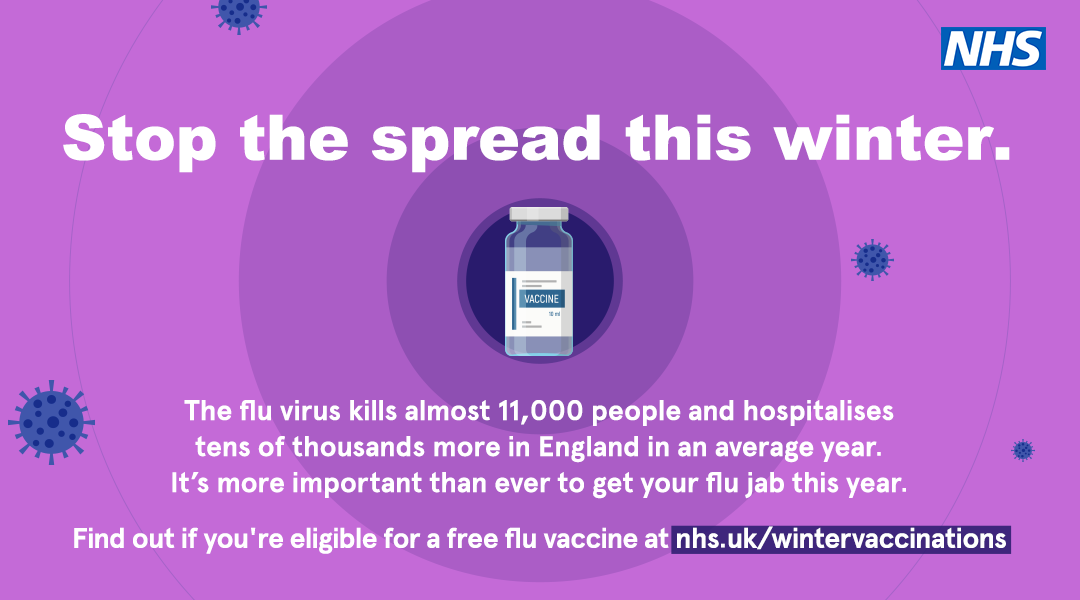Flu Vaccination
Flu vaccination is safe and effective. It's offered every year through the NHS to help protect people at risk of getting seriously ill from flu. The 2024 flu vaccine will be offered from the autumn.
Flu is a highly infectious and common viral illness that is spread by coughs and sneezes. It is not the same as the common cold.
Flu is caused by a group of different group of viruses and symptoms tend to be more severe and last longer. You can catch flu all year round, but it is especially common in winter, which is why it is also known as ‘seasonal flu’.
Why flu vaccination is important
Flu vaccination is important because, while flu is unpleasant for most people, it can be dangerous and even life threatening for some people, particularly those with certain health conditions.
The best time to have your flu vaccine is in the autumn or early winter before flu starts spreading. But you can get your vaccine later.
You can find out more about the flu vaccination on NHS England's flu vaccination pages.

Flu vaccine and coronavirus (COVID-19)
Flu vaccination is important because:
- if you get flu and COVID-19 at the same time, research shows you’re more likely to be seriously ill
- getting vaccinated against flu and COVID-19 will provide protection for you and those around you for both these serious illnesses
If you’ve had COVID-19, it’s safe to have the flu vaccine. It will still be effective at helping to prevent flu.
People who should have the flu jab
The injected flu vaccine is offered free of charge on the NHS to people who are at risk. This is to ensure they are protected against catching flu and developing serious complications.
You’re eligible for a FREE NHS flu vaccine if you:
- are 65 and over (including those who will be 65 by 31 March 2024)
- have certain health conditions
- are pregnant
- are in long-stay residential care
- receive a carer's allowance, or are the main carer for an older or disabled person who may be at risk if you get sick
- live with someone who is more likely to get a severe infection due to a weakened immune system, such as someone living with HIV, someone who has had a transplant, or is having certain treatments for cancer, lupus or rheumatoid arthritis.
For the latest list of who is eligible, please visit the NHS website.
Flu vaccine for children
NHS England has confirmed it will start by prioritising flu vaccinations for children from September, to prevent children from getting seriously ill from flu and ending up in hospital, and to break the chain of transmission of the virus to the wider population.
School aged children will be able to get the flu vaccine at school or at community clinics, and those with long term health conditions can also get the vaccine at GP surgeries. Children aged two and three years will be able to get an appointment with their GP practice.
Children aged two, three and four years can have a nasal spray vaccination from their GP; while school children in years 1, 2 and 3 will be invited by the school health nursing teams to get the nasal spray vaccination at school. Help protect them from flu with one simple nasal spray. It is free, fast and painless. Do not put it off. Take up the offer from your GP as soon as you can. Flu can be horrible for little children and if they get it, they can easily spread it around the whole family. Find out more on the NHS website.
Flu jab for health and social care workers
Outbreaks of flu can occur in health and social care settings, and, because flu is so contagious, staff, patients and residents are all at risk of infection.
If you are a front-line health and social care worker, you are eligible for an NHS flu jab to protect yourself, your colleagues and other members of the community.
It is your employer’s responsibility to arrange vaccination for you. So, if you are an NHS-employed front-line healthcare worker, the NHS will pay for your vaccination. If you are a social care worker, your employer – for example, your local authority – will pay for vaccination. In the case of health and social care workers employed by private companies; those companies will arrange and pay for the vaccinations.
Where can I get my flu jab?
You can have the NHS flu vaccine at:
- your GP surgery – they will contact you to book an appointment
- a pharmacy offering the service
- your midwifery service if you’re pregnant
- a hospital appointment
If you do not have your flu vaccine at your GP surgery, you do not have to tell the surgery. This will be done for you.
Find your nearest pharmacy offering the free NHS flu vaccine


